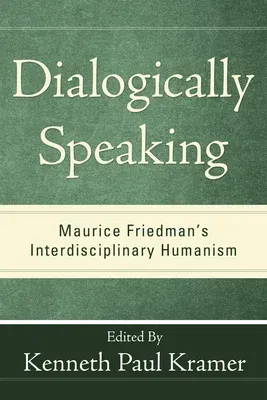What makes us authentically human? According to Maurice Friedman,
world-renowned Martin Buber scholar, translator, and biographer, it is
genuine dialogue. ""When there's a willingness for dialogue,"" Friedman
says, ""then one must 'navigate' moment-by-moment. It's a listening
process."" Friedman addresses our humanity in ever-unique ways through
his dialogue with philosophy, literature, religion, and psychotherapy.
At least two things make this book new. Friedman presents his
wide-ranging thought directly in five original essays forming an
""intertextual compass,"" which is then elaborated upon by colleagues
familiar with his work. Second, a special feature of this book is found
at the end of each part which invites readers to engage with questions
drawn from and pointing toward Friedman's writing. The book's intended
audience includes teachers, scholars, and students interested in
dialogical approaches to any of the human sciences. In a time when we
are in danger of losing our human birthright, Friedman's
interdisciplinary insights point us again to ""the touch of the other.""
CONTRIBUTORS: Royal E. Alsup, Pat Boni, Kenneth N. Cissna, Maurice
Friedman, Richard Hycner, Harold Kasimow, Nathan Katz, Kenneth Paul
Kramer, Barbara R. Krasner, Donald J. Moore, S.J., John Raphael Staude,
Richard D. Stanton, Elie Wiesel ""Professor Kenneth Kramer took upon
himself a very heavy task to edit a festschrift in honor of his teacher
and mentor, professor Maurice Friedman. The selected articles, written
by first rate scholars of different cognate fields, are very impressive
and highlight the contribution of two great thinkers of our time:
professors Martin Buber and Maurice Friedman. The contributors of this
festschrift demonstrate a deep hunger for knowledge and genuine
relationship. The result of their efforts is a great endowment for an
excellent scholar and true human being (a mentch), professor Maurice
Friedman, and at the same time, a revival of the endowment for another
great thinker and teacher of our time, Martin Buber."" --Mishael M.
Caspi Professor of Religion Judaic Studies & Islamic Civilization
Kenneth Paul Kramer is Professor Emeritus of Comparative Religious
Studies at San Jose State University, where he taught from 1978 to 2001.
He is the author of Redeeming Time: T. S. Eliot's Four Quartets (2007);
Martin Buber's I and Thou: Practicing Living Dialogue (2003); Death
Dreams: Unveiling Mysteries of the Unconscious Mind (1993); The Sacred
Art of Dying (1988); and World Scriptures: An Introduction to
Comparative Religions (1986).


